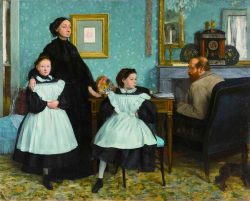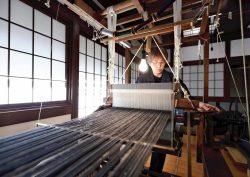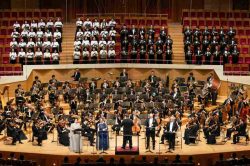Opera ‘William Tell’ Graces Tokyo New National Theatre; Performance Stuns as All-Round Bullseye

William Tell (Gezim Myshketa), left front, and Arnold (Rene Barbera), right front, in Act II of “William Tell” at the New National Theatre, Tokyo.
11:30 JST, November 28, 2024
Rossini’s last opera “William Tell,” or “Guillaume Tell,” received its first Japanese performance in its original French language at the New National Theatre, Tokyo, on Wednesday.
The new production is conducted by Kazushi Ono and directed and designed by Yannis Kokkos. The over 4½-hour performance with two intermissions did not feel long thanks to Ono’s tight conducting, Kokkos’ inspiring stage direction and the superb cast.
The opera in four acts, which premiered in 1829, is based on Schiller’s play about the Swiss folk hero, Guillaume Tell. The story is set in a Swiss village under Austrian occupation in the 14th century. Tell is an able navigator and excellent archer who is also the leader of the villagers seeking freedom from a Hapsburg lord. There is also a Romeo-and-Juliet-like love story between Arnold, whose father is killed by local governor Gesler, and Mathilde, a Hapsburg princess.
Rossini was 37 when he declared he would retire from writing operas. This opera is quite different from the comical ones that had made him famous, showing his maturity and depth as a composer. The dramatic music, with beautiful melodies and harmonies, almost anticipates Wagner at times.
Ono heartily conducted the famous overture, after which he made a rare gesture as conductor in asking members of the Tokyo Philharmonic Orchestra to stand up in the pit to receive an ovation. He managed to give the music a great degree of integrity through the singers, the chorus and the orchestra, particularly in the magnificent final scene of Act II.
Kokkos designed the set and costumes with support from Anne Blancard as his artistic collaborator. Large arrows suspended from above represented the oppression the villagers were feeling. Projection mapping was used to show the storm at the lake in Act IV. Gesler’s men were dressed in clothing reminiscent of Nazis.
The famous apple shooting scene was quick and impactful. An image of ruins was shown in the final scene, as the villagers stand victorious, as if to indicate all wars have consequences, even today.

William Tell shoots an arrow at an apple on his son’s head in Act III of “William Tell”
The title role was sung by Albanian baritone Gezim Myshketa, who impressed the Japanese audience with his refined interpretation of Germont in “La Traviata” in 2022. He made the most of his robust voice and great stage presence.
American tenor Rene Barbera, arguably the finest Rossini tenor of our time, returned to the Tokyo opera house as Arnold following his successful performances in “Il Barbiere di Siviglia” in 2020 and “La Cenerentola” in 2021. His effortless high notes were a pleasure to the ears.
Russian soprano Olga Peretyatko sang Mathilde with her well-controlled voice, which made a particularly profound impression in her Act II aria.
Baritone Hidekazu Tsumaya effectively portrayed Gesler as a menacing dictator. Soprano Yoko Yasui’s pure and clean voice was perfect as Tell’s son, Jemmy, and mezzo-soprano Junko Saito’s sincere singing as Tell’s wife Hedwige pulled at the heartstrings.
The New National Theatre Chorus performed amazingly in this opera in which the chorus plays a vital role. There are also several ballet scenes, stylishly choreographed by Natalie van Parys.
A small, yet interesting, Rossini exhibition in the theater’s foyer displays precious material related to the composer, such as scores written in the composer’s time and costume designs of the original production.
Further performances of “William Tell” will take place from 2 p.m. on Nov. 28 and 30 at the New National Theatre, Tokyo, near Hatsudai Station, Tokyo.
Visit https://www.nntt.jac.go.jp/english/opera/for more information and tickets.
Top Articles in Culture
-

BTS to Hold Comeback Concert in Seoul on March 21; Popular Boy Band Releases New Album to Signal Return
-

Director Naomi Kawase’s New Film Explores Heart Transplants in Japan, Production Involved Real Patients, Families
-

‘Jujutsu Kaisen’ Voice Actor Junya Enoki Discusses Rapid Action Scenes in Season 3, Airing Now
-

Tokyo Exhibition Offers Inside Look at Impressionism; 70 of 100 Works on ‘Interiors’ by Monet, Others on Loan from Paris
-

Traditional Japanese Silk Hakama Tradition Preserved by Sole Weaver in Sendai
JN ACCESS RANKING
-

Producer Behind Pop Group XG Arrested for Cocaine Possession
-

Japan PM Takaichi’s Cabinet Resigns en Masse
-

Man Infected with Measles Reportedly Dined at Restaurant in Tokyo Station
-

Israeli Ambassador to Japan Speaks about Japan’s Role in the Reconstruction of Gaza
-

Videos Plagiarized, Reposted with False Subtitles Claiming ‘Ryukyu Belongs to China’; Anti-China False Information Also Posted in Japan






















